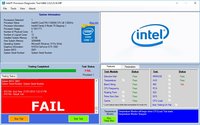The Ugly Fugly
n00b
- Joined
- Jul 26, 2016
- Messages
- 4
Hi All,
I recently put together a new rig and the specs are as follows.
Specs:
Issue:
I've been coming across issues from the get go with Windows 10. At first I was experiencing a lot of BSOD issues which to me appeared to either be driver or memory related. This was even after updating to the latest drivers from Nvidia for graphics, latest drivers from ASUS for chipset, audio, ethernet & WiFi and Samsung NVMe driver for the 950 Pro.
So I decided to do another clean install and try and tackle it step by step. Now I'm finding that after a clean install and letting windows install all the latest updates (prior to installing any software or driver updates) Windows 10 will stutter a bit and then randomly restart. It will constantly do this, and only this morning I'm finding it is going to a blank screen after Windows 10 login.
Attempted:
So far I've tried the following:
I'm out of ideas and no step closer to figuring out if its hardware issue or software/Windows 10 related. I can rule out RAM from the memtest. I'm hoping to dump the 1080 GTX into my partner's computer tonight to see if its the card issue. I'll probably try another clean install of W10 on an older SSD tonight. If that fails I'll go back to W7 and see if I have the same issue. Not sure how to rule out Motherboard, CPU and PSU issues though.
If anyone has any suggestions or leads it'd be much appreciated and thanks in advance.
---------------
Issue is solved. In the end it turned out the RAM was faulty. After RMA'ing to Corsair and receiving my replacement RAM the PC has been running smoothinly.
Thanks all again for the suggestions and assistance.
I recently put together a new rig and the specs are as follows.
Specs:
- CPU - i7 6850k
- Motherboard - ASUS Strix X99 (Latest Bios 0801)
- Graphics - EVGA 1080 GTX
- RAM - Corsair DDR4 3334MHz 32GB (CMD32GX4M4B3333C16)
- SSD - Samsung 950 Pro 512GB
- PSU - Corsair AX1200i (1200W)
Issue:
I've been coming across issues from the get go with Windows 10. At first I was experiencing a lot of BSOD issues which to me appeared to either be driver or memory related. This was even after updating to the latest drivers from Nvidia for graphics, latest drivers from ASUS for chipset, audio, ethernet & WiFi and Samsung NVMe driver for the 950 Pro.
- Page Fault In Nonpaged Area
- Pool Corruption In File Area
- Driver Overran Stack Buffer
- IRQL Not Less or Equal
So I decided to do another clean install and try and tackle it step by step. Now I'm finding that after a clean install and letting windows install all the latest updates (prior to installing any software or driver updates) Windows 10 will stutter a bit and then randomly restart. It will constantly do this, and only this morning I'm finding it is going to a blank screen after Windows 10 login.
Attempted:
So far I've tried the following:
- Memtest86 on each RAM Stick (Checked out on 4 passes)
- Clean install Windows 10, multiple times (and feels like its getting worse and sluggier each time)
- Latest Driver Install from ASUS & Nvidia
- BIOS Settings Default (i.e. turned off XMP Profiles, Re-enabled CSM)
I'm out of ideas and no step closer to figuring out if its hardware issue or software/Windows 10 related. I can rule out RAM from the memtest. I'm hoping to dump the 1080 GTX into my partner's computer tonight to see if its the card issue. I'll probably try another clean install of W10 on an older SSD tonight. If that fails I'll go back to W7 and see if I have the same issue. Not sure how to rule out Motherboard, CPU and PSU issues though.
If anyone has any suggestions or leads it'd be much appreciated and thanks in advance.
---------------
Issue is solved. In the end it turned out the RAM was faulty. After RMA'ing to Corsair and receiving my replacement RAM the PC has been running smoothinly.
Thanks all again for the suggestions and assistance.
Last edited:
![[H]ard|Forum](/styles/hardforum/xenforo/logo_dark.png)
